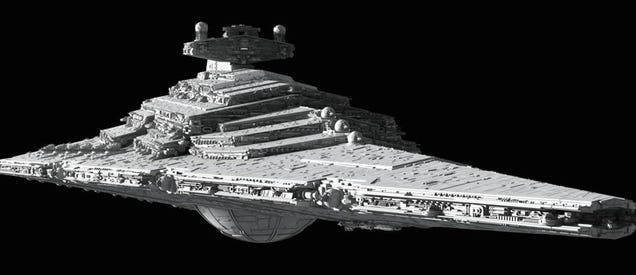
A classic debate! Good or Evil? Chocolate or Strawberry? Star Trek or Star Wars (excluding the Death Star)? But unlike those timeless questions this one really does seem to have a compelling answer. And its not what the majority seem to think.
A few necessary caveats (take heed ye trolls):
1) Although it (should) hardly need saying—these are both completely fictional universes whose technology and scientific foundations are, at best, bolted on after the fact as part of the setting and/or necessary plot devices. This entire debate is like meaningfully debating the combat prowess of Unicorns vs. Dragons. But of course, we're going to do it anyway.2) The goal is to assume the most favorable interpretations for each technology as demonstrated most coherently by each canon. Obvious mistakes (i.e using parsecs as a measure of time... Hello Han) or figures completely inconsistent with the results offered (Star Destroyers with power generation of 7.75 x 1024 W... only 100 times less than the sun!) will be ignored.For those crying foul a Star Destroyer that needs that much power (to create the abilities displayed) would represent the most fantastic inefficiency ever conceived. Likewise, some of the energy readings suggested for Star Wars laser weapons would instantaneously vaporize any unshielded craft—not to mention the atmosphere in between them—in rather spectacular fashion. Nothing in the physical behavior of these weapons supports these values (for instance that Slave 1 has 64,000 GW lasers or 190 Megaton missiles. Never, in any battle, was a blast of that nature or kind observed).Bottom line: All weapons and systems should be evaluated on how they actually perform as depicted in the canon as opposed to often innumerate and psuedo-scientific gibberish offered in support of them. That being said, where a vaguely credible explanation has been offered, it will generally be taken (i.e. lasers are lasers).
3) The treatment of technology dramatically complicates the task of comparison. Star Trek consciously attempted to provide at least some basis (however weak or novel) for the science behind their technology. Star Trek represents a technological utopia and was promoting the idea of a better future via modern technology. This is also evident in that the technology of Star Trek advances dramatically over the course of the various seasons (including referencing far future Star Trek timelines with mastery over time itself). Star Wars, on the other hand, makes no such claims and depicts an utterly static technological milieu in which no appreciable advances have been made (save perhaps the Death Star itself) in tens of thousands of years. In addition, Star Wars often offers little—if any—scientific explanation for its tech (Hyperspace—it's fast!). I am assuming the general tech capabilities of Trek as found as late as Voyager.Now, those out of the way lets get to the point. This is not a close fight. Despite the desires of the many fans, the Star Trek universe is rife with economic, tactical, social, and technological superiority. Claims of Star Wars victories all seem to echo the Stalin-esque view that "Quantity has a Quality all its own." But this is profoundly misguided. Let's break down why.
Economic Factors
Star Wars population is very difficult to assess. Some estimates suggest a 1,000,000 world Empire. But the Galactic Senate depicts a vastly smaller political entity. According to Star Wars Wiki, the Empire was divided into units of 50 systems each with a senator. However, the Senate only has 2,000 members. Which means a galactic polity of 100,000 active members. This is still vastly greater than the Federation with something like 150 members and 1-5 thousand worlds.
However, the nature of this population is most important. The Empire, while having far larger population, appears weakly integrated. Entire populations (quite commonly) are depicted as isolated and poor. Basic farming or harvesting seems commonplace. Much of the population appears uneducated and even tribal. While the core worlds are densely populated, they are apparently completely dependent on agricultural and other products from the empire. This means Star Wars retains a traditional resource economy model....MORE
HT: the accounting nerds at GoingConcern